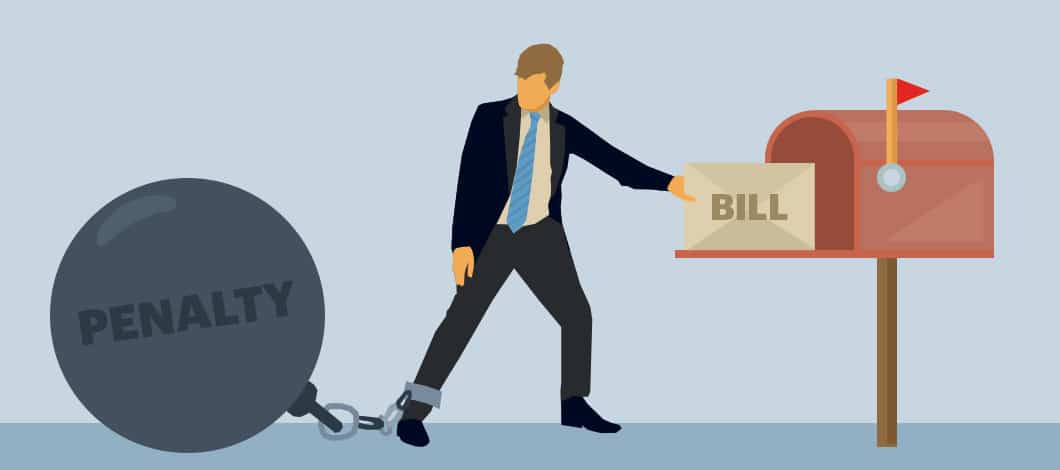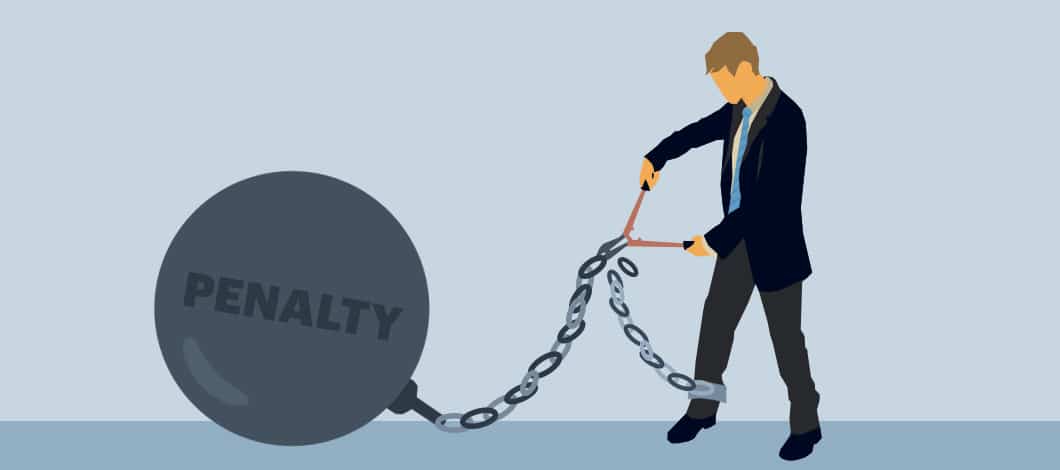What is a prepayment penalty fee, and can you avoid it?
We’ll answer some common questions about this kind of fee. First, we’ll look at what loan prepayment fees are and why some lenders use them. Then we’ll review how to tell if your contract has a prepayment penalty clause, what types of payments trigger fees and how prepayment fee amounts are calculated. Finally, we’ll offer some tips on how to avoid paying prepayment penalties.
Prepayment penalties are fees some lenders charge if you pay all or some of a loan off before it’s due. They are used frequently in the mortgage industry, but may be used in other industries as well.
Let’s say you took out a new loan to refinance a commercial real estate term loan with a 10-year term and the contract for your original loan says that if you pay it off within the first 3 years, you owe 2% of your outstanding balance as a prepayment penalty. At the time you refinance the loan, you still owe $100,000 on your balance. Your prepayment penalty would be $2,000.
Why Do Some Loans Include an Early Payoff Penalty?
Prepayment clauses protect lenders from losing money they normally would make from interest payments. Lenders take on risk when they extend financing for loans, especially loans in large amounts. They do so with the expectation of turning a profit, with interest representing the main source of profit, along with other loan fees.
When borrowers pay off a loan early, it cuts into the interest the lender was expecting to earn, removing their main incentive for extending the loan in the first place. To make up for this loss, lenders may charge prepayment penalty fees.

Do All Loan Contracts Include a Prepayment Penalty Clause?
No, not all loan contracts contain prepayment penalties. Amendments to the Truth in Lending Act (TILA) enacted under the Dodd-Frank Wall Street Reform and Consumer Protection Act (Dodd-Frank Act) place restrictions on mortgage loan prepayment penalties. These restrictions prohibit prepayment penalties for certain types of mortgage loans and requiring lenders to offer penalty-free alternatives for all mortgage loans.
Despite these restrictions, some mortgage loans and some other types of loans can have prepayment penalties, so you must check the language of an individual loan contract to ascertain whether it contains such a clause.
How Can I Tell If My Loan Contract Includes a Prepayment Clause?
Federal regulations under TILA require lenders to disclose prepayment penalties. You can find these disclosures in your loan contract, typically attached in a section devoted to disclosure documents or addendums. For convenience, you can ask your lender if they charge a prepayment penalty and, if so, ask them to refer to the part of your contract which contains the details.
If you’ve already taken out a loan, your monthly billing statement should mention any prepayment penalties which are in your contract.
What Types of Prepayment Penalties Are There?
Mortgage prepayment penalties come in a couple of main varieties:
- Soft prepayment penalties only apply if you refinance a mortgage, but not if you sell a property
- Hard prepayment penalties apply both if you refinance a mortgage or if sell a property
The exact language of your loan contract will specify which type of penalty applies.
What Types of Payments Trigger Prepayment Penalties?
Not all early payments trigger prepayment penalties. These fees mainly are reserved for payments that cover large portions of your loan, such as refinancing a mortgage or selling a property. However, many lenders allow borrowers to pay off a portion of their balance each year without incurring a penalty. For instance, a lender may allow you to pay up to 20% of your balance each year without penalty.
What will trigger a prepayment penalty varies depending on whether you have a soft or hard prepayment penalty agreement. With soft prepayment penalties, you’ll incur a fee if you refinance a property but not if you sell it, but with hard penalties, you’ll incur a fee if you refinance or if you sell.
How Are the Fees Calculated?
Several different models may be used to calculate prepayment penalty fees:
- Percentage of remaining balance: Your fee is based on how much balance you owe at the time of repayment
- Sliding scale percentage based on term length: For example, the percentage may be higher if you pay off during the first year of the loan than if you pay off during the second year
- Set number of months’ interest: For instance, you may pay 6 months of interest
- Fixed amount, namely a set dollar figure
Review the language of your contract for the method applicable to your loan.

How Can I Avoid Paying a Loan Prepayment Penalty?
There are several methods you can use to avoid paying prepayment penalties:
- Work with lenders and loan products that don’t use one
- Negotiate with your lender for a lower penalty fee or the removal of the clause before signing your contract
- Keep your prepayments under the annual limits allowed for making balance payments without penalty
- If you have a soft prepayment penalty agreement, you can sell your property rather than refinancing it
- Stick with your loan’s payment schedule
The first couple of these methods are the easiest ways to avoid these fines. Study the language of loan contracts carefully before agreeing to anything. If your contract includes a prepayment penalty clause, see if your lender is willing to alter or remove it.
Is It Ever Worth It to Pay Prepayment Penalties?
It can be worthwhile to pay a prepayment penalty if the money you’ll save on interest outweighs the amount of the fee you would pay. For example, if you refinance your loan with a loan that has significantly lower interest, you may save money even with paying the fee.
The only way to determine whether this move will save you money is by checking your numbers. When doing this, keep in mind that interest on your loan may be tax-deductible, while your prepayments may not. Review your options with a professional accountant, loan adviser or another expert.
Don’t Pay Unnecessary Prepayment Fees
Prepayment fees are penalties for paying off loans early. They protect lenders from losing money on interest payments, but they can cost borrowers money.
The law requires lenders to disclose prepayment penalties in loan contracts, so you should review your contract carefully to understand your obligations. Prepayment fees can be calculated using a number of methods, such as a percentage of remaining balance or a designated number of months’ worth of interest.
You can avoid payment prepayment fees by choosing lenders who don’t use them, by making payments that fall below annual limits or simply by sticking to your loan payment schedule. However, in some cases, it may be worthwhile to pay the penalty if you can save enough on interest by refinancing your loan.
Fast Capital 360 uses digital technology to match your loan needs with lenders who meet your criteria. Take a few minutes to fill out our free, no-obligation prequalifying application and see your loan options.










